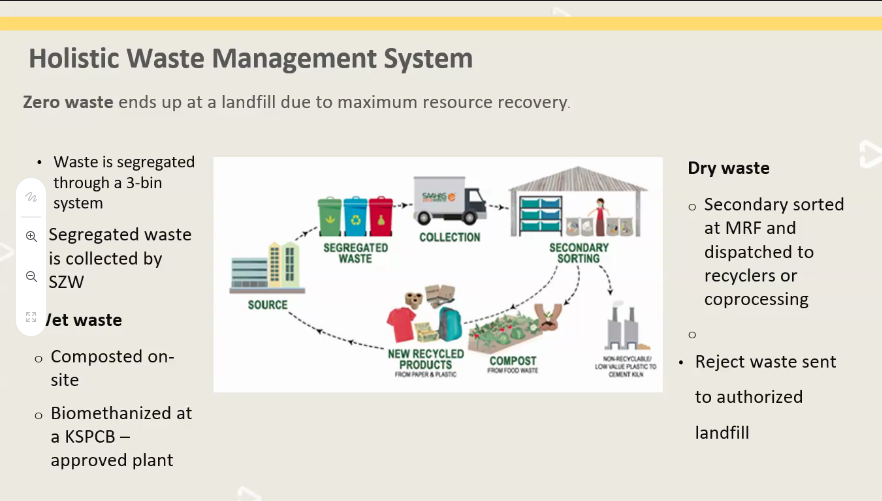
The Confederation of Indian Industry (CII) organized a webinar on Decentralized waste management solutions for India earlier today. Moderated by Ulhas Parlikar, Former Director, Geocycle – ACC, the key speakers included Sharad Ughade, Asst. Commissioner – G-South Ward, MCGM and Director, Information Technology, Wilma Rodrigues of Saahas Zero Waste and Rahul Chhabra, CEO – Transchem Agritech Pvt Ltd.
Below are some of the highlights of the session:
- Sharad Ughade, Asst. Commissioner – G-South Ward, BMC
Mr Ughade began the session by sharing some of the challenges faced by the Municipal Corporation of Greater Mumbai (MCGM) in implementing decentralized waste solutions in Mumbai. Specifically, in-situ segregation and waste processing, citizen participation and awareness building, availability of material recovery facilities, and other infrastructure development (including waste collection and transportation vehicles). Mr Ughade highlighted how the MCGM was increasing its fleet of vehicles with separate compartments for segregated waste collection. He detailed how Mumbai’s first waste-to-energy plant at Pali Hill, Bandra in partnership with the Resident Welfare Associations and their CSR partners won an award under the Best Innovation Category of Swachh Bharat Abhiyan. Pali Hill, he said, is now garbage free. Mr Ughade underlined the importance of involving informal waste workers who have to be involved in the formal waste management system.
The MCGM has taken two key steps to promote decentralization. One, any new building constructed in Mumbai has to develop a decentralized system of waste management. Two, communities that process 100% of their waste within premises are given a 10% tax rebate.

- Yashas Bhand, Director, Yasasu EMS Pvt Ltd.
Mr Bhand discussed how cities need to have a mix of centralized and decentralized waste management solutions, depending on local factors such as waste quantity and quality. Micro planning is essential in terms of waste treatment but it is a challenge, given the absence of relevant and accurate data on waste generation in most parts of the country. This impacts the output of decentralized waste processing. Highlighting the absence of industry status for the waste sector as a roadblock in developing and promoting decentralized SWM technologies, Mr Bhand expressed hope that things have improved post-2016. For instance, through property tax rebates offered by municipal corporations to those processing their own waste, and priority lending for biogas sectors.
Mr Bhand discussed how In the decentralised system, from a provider’s perspective and end user perspective, there are also questions about how does one utilise the by-product of the decentralized treatment. More investment is required into research on this subject. at any time of a specific time. For instance, many decentralised initiatives fail because compost plants slurry that it may not have a big market.
- Wilma Rodrigues, Saahas Zero Waste

Ms Rodrigues reminded the audience that decentralised waste management is part of India’s regulatory framework since the last 20 years (Solid Waste Rules of 2001) and the 2016 rules also emphasize decentralized waste management. Ms Rodrigues said that decentralization is the future for waste management in India and the pandemic provides an opportunity to bring about a lasting change. In Bengaluru, where 40% of the waste comes from bulk generators, Ms Rodrigues shared how Saahas is working with these entities to convert their waste into a resource through a viable business model. “Technology is important but it cannot replace nature. We have to work with a good composting system and have good biogas systems in Bangalore,” she concluded.
- Jabir Karat, Green Worms Waste Management
Mr Karat explained how, in comparison to other Indian states, Kerala has very good source segregation, especially in the semi-urban and rural areas due to various awareness programs. The quality of dry-waste is very good too and wet waste collection is also minimal since the government gives subsidies for composting at the household and community level. Willingness to pay for waste disposal from households is also very good in Kerala and charges range from Rs 50 in rural and semi-urban areas to Rs 80 – 100 in the cities. However, in the absence of landfills in Kerala (barring Cochin) Mr Karat lamented how informal dumpsites have proliferated across the state and need urgent attention. Mr Karat’s message to attendees stressed on how entrepreneurship in waste management is simple and can be started by anyone with minimum capital. Citing his own example, Mr Karat said he started with 300 kg of waste/day and today manages 45,000 kg. His company Green Worms Waste Management is generating employment. They train people in waste collection and segregation and make informal workers economically independent. “One ton of waste generates employment for 8 people in terms of collection. We work with government bodies to make sure that the system works well and have successfully recycled 97 percent of waste, sending only 3 percent to landfills,” Mr Karat concluded.
Mr Rahul Chabria, CEO of Transchem Agritech Pvt. Ltd. shared cost-effective, green technologies for decentralized wastewater treatment. Mr Parlikar concluded the session by lauding the innovative recycling processes and technologies being developed across India for waste recycling. “There are a lot of opportunities to innovate and develop sustainable technologies for entrepreneurs and basically anyone who cares about the environment and wants to make a difference.”
Picture Credit: Municipal Corporation Chandigarh



